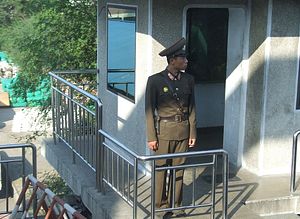Though contrite North Korean officials humbly bowed after the recent building collapse in Pyongyang, they are offering no apologies for the impending destruction along the Sino-North Korean border. According to South Korean media reports, North Korean authorities are planning to demolish all structures within 200 meters along a 270-kilometer stretch of the border with China. The initiative specifically targets Ryanggang Province and the provincial capital, Hyesan, which has served as a major defection route in recent years. Ostensibly, buildings will be leveled and homes destroyed to make way for a new road, though many believe the true intention is an intensified border crackdown aimed at preventing defections, smuggling and a growing influx of information from the outside world.
North Korean officials are unlikely to be able to provide alternative accommodations for the thousands of border residents displaced by the new road. Thus, the mass demolitions will likely exacerbate mounting tensions in the region and perpetuate the increasing privatization of illicit activities (pdf) by North Korea’s elite, who are “feeding off the suffering and deprivation of the population.”
The border has also become increasingly vulnerable. Some border guards will not only stand watch during defections for as low as $40, they will literally carry people across the river for an extra $20. The North tried installing tens of thousands of CCTV cameras to thwart smugglers and defectors, but the footage can be erased for a bribe. Even more ominously for the regime, top-secret North Korean military data, including wartime plans and electronic warfare guidelines, are being sold to “information traders” in the Chinese border region.
Within the context of these border complications, North Korean leader Kim Jong-un is faced with a ceaseless dilemma: the burgeoning private economy and cross-border information flows pose existential threats to his rule, but smuggled goods help stave off economic collapse while accompanying bribes appease corrupt, disgruntled officials.
The young leader seems more preoccupied with the former consideration, and has made tightened border security the hallmark of his new regime. Following the death of his father, Kim Jong-il, in December 2011, 20,000 additional soldiers were dispatched to the Sino-North Korean border, people caught fleeing were executed, and families of defectors were dragged off in the middle of the night amidst a “brutal” border atmosphere. A host of additional measures by North Korean authorities – including enhanced border surveillance techniques and modifications within the security apparatus – appear to be working in some respects, as the number of North Korean refugees reaching South Korea has significantly declined since Kim Jong-un took power.
On the other hand, outside information and smuggled foreign goods have continued to filter into the country via the long, porous border with China for years, despite numerous efforts to the contrary. This made Kim Jong-il so concerned that he initially hatched the border demolition scheme. At the time, however, smuggled goods made up a large percentage of North Korea’s underground market economy, meaning too many North Koreans – including an array of security personnel – would be suddenly plunged into even greater destitution.
Ultimately, the plan was scrapped, but Kim Jong-un has taken it upon himself to revive his father’s idea. In March, Radio Free Asia reported that North Korean authorities appeared to be preparing for the demolition of structures along the border with China, as they began marching into homes and seizing the property owners’ deeds. The justification at the time was to clear space in order to plant grass along the border, but in April, Kim Jong-un reverted to the original plan of constructing a new road.
The regime has mobilized the military to carry out these “urgent” border endeavors, which will supposedly be achieved by September, but North Korean authorities are infamous for failing to complete grand public works projects. In one instance, officials announced in 2009 the construction of 100,000 new homes in Pyongyang, but cut the target in 2011 to only 20,000 homes due to a lack of funds and building materials. By 2013, the project was completely abandoned. Moreover, many people lost their homes to make way for the failed housing project, and some of the poorly constructed buildings collapsed, causing injury and death.
It appears that residents of Ryanggang will soon be (further) afflicted by Pyongyang’s poor planning and utter disregard for the welfare of its people. In a country plagued by a dismal economy, food shortages, and declining foreign aid, one can only imagine how the leadership will justify this new road to nowhere.
Seongmin Lee is a North Korean refugee living in Seoul, South Korea. He has given numerous speeches about North Korea and is frequently interviewed by mainstream media outlets. Brian Gleason recently completed his master’s degree at Yonsei University in Seoul, and contributes to SinoNK.com, a scholarly blog focusing on Sino-North Korean relations.

































